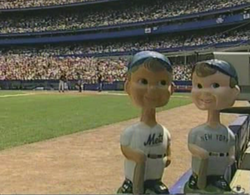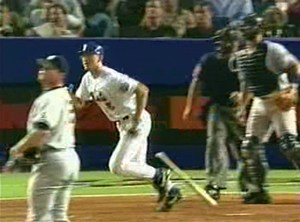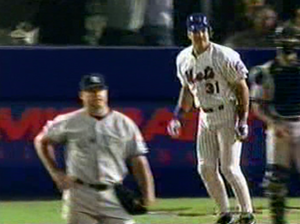Click here for an intro/manifesto on The 1999 Project.
 July 9, 1999: Mets 5, Yankees 2
July 9, 1999: Mets 5, Yankees 2
Though the Mets played well between the end of the first Subway Series and the start of the second one, they had also just completed a disappointing four-game split with the lowly Expos. “There was a listless atmosphere,” Jack Curry wrote of that series in The New York Times, “and the Mets always seemed to be in danger of being lulled to sleep and into feeling that they were fine. But they were not.”
There was no danger of a subdued atmosphere at Shea for the Friday night opener of this series. The pitching matchup was a rematch of the last game of the Bronx leg of the Subway Series: Al Leiter for the Mets, Roger Clemens for the Yankees. That game ended the Mets’ eight-game losing streak and turned the season around for both the team and Leiter. After a shaky start to his year, the lefty had been money in bank ever since his outing at Yankee Stadium.
As for his opponent, Clemens had some moments of brilliance in his first year in pinstripes, but hadn’t yet exhibited the elusive quality that brands a player “a true Yankee” by whoever decides such ephemeral things. In the Times, Buster Olney wrote of The Rocket:
Clemens knocked down a batter and struck out seven against Boston on May 27, and the Yankees expected him to take off after that. But he continued to pitch inconsistently. He whiffed 13 Texas Rangers on June 17 and shut out Detroit on June 29, prompting Manager Joe Torre to say Clemens was getting stronger and ready to pitch the way he usually does.
It still hasn’t happened. He is making mistakes that are at odds with his legend. When the Yankees acquired him in spring training, they assumed he would be like David Cone, finding a way through jams. Instead, Clemens often pitches himself into trouble.
Olney also noted, “Shea Stadium has never been kind to Clemens, who lost his only regular-season start here in 1997. And of course, there was 1986.”
Clemens looked a bit unnerved early on, with a walk to Rickey Henderson, a wild
pitch that moved him down to second, and another walk to John Olerud in the bottom of the first. That brought Mike Piazza to the plate with a chance to do some early damage, but Clemens induced a ground ball double play to end the inning.
In the second, Clemens gave up a one-out double to Brian McRae. A fly out from Roger Cedeno brought up Rey Ordonez, with Leiter on deck. Clemens chose to try and get Ordonez and have Leiter lead off the next inning. Normally, this would be an obvious decision, but the shortstop had been hitting over .300 in his last 30 games, and he hit Clemens’ first-pitch fastball up the middle to bring McRae home from second and plate the first Mets run.
Leiter cruised through the first two innings, but walked Chad Curtis to lead off the top of the third. After an ugly-but-effective sac bunt from Clemens, Chuck Knoblauch drove Curtis home with an RBI single. Leiter recovered with groundouts from Derek Jeter and Paul O’Neill to end the inning.
 Perhaps seizing this momentum, Clemens easily retired the first two batters in the bottom of the third, then backed John Olerud into an 0-2 count. But after throwing two balls, Clemens hung a splitter right down the middle that Olerud cranked off the big scoreboard in right field to put the Mets up 2-1.
Perhaps seizing this momentum, Clemens easily retired the first two batters in the bottom of the third, then backed John Olerud into an 0-2 count. But after throwing two balls, Clemens hung a splitter right down the middle that Olerud cranked off the big scoreboard in right field to put the Mets up 2-1.
Leiter responded with two scoreless innings, then got into some trouble in the top of the sixth. Jeter hit a lead off single, then O’Neill ripped a double that rolled all the way to the
center field wall, scoring Jeter from first. After a ground out from Bernie Williams, O’Neill attempted to steal third but was thrown out on a close play.
Displaying his typical restraint and maturity, the outfielder complained loud, long, and vociferously to third base ump Dana DeMuth, with the usual results. I have this game on DVD, and I can’t believe that O’Neill didn’t get tossed. Were umps more mellow 10 years ago than they are now, or was O’Neill just given more rope because of his superstar status and/or ‘leadership’ rep?
[As a side note, my DVD of this game has the MSG/Yankees feed. The guys in the booth were Ken Singleton and Jim Kaat, both of whom were great (and still are). It might be hard to imagine, but there was once a time when the Yankees employed capable, knowledgable play-by-play guys, rather than the total buffoons they have now.]
The Mets responded immediately in their half of the sixth. Edgardo Alfonzo led off with a single, and Olerud followed by working a walk; Clemens seemed to want no part of him after his home run earlier. That brought Piazza to the plate in yet another prime RBI spot.
In his still-young stint with the Mets, the catcher had a rep of being “un-clutch”. It was a rep somewhat borne out by the stats (to that point in the season, he had a batting average of .220 with runners in scoring position), but more a reflection of the enormous contract he’d signed in the off-season–and the enormous expectations that went with it. I still remember going to games in 1998-1999 and hearing some (not all, mind you, but some) Mets fans boo him for the crime of not hitting a home run every time he came to bat.
 Piazza obliged their wishes in this spot. He turned on a 2-1 slider and whipped it into the left field bleachers for a three-run homer. It was a prototypical Piazza dinger, one that got out of the park so fast you could blink and miss its flight. No boos from the crowd this time, who demanded (and received) a curtain call from the catcher.
Piazza obliged their wishes in this spot. He turned on a 2-1 slider and whipped it into the left field bleachers for a three-run homer. It was a prototypical Piazza dinger, one that got out of the park so fast you could blink and miss its flight. No boos from the crowd this time, who demanded (and received) a curtain call from the catcher.
Leiter pitched 1-2-3 seventh and eighth innings to cap another stellar outing against the Yankees. Armando Benitez came on for his biggest save yet, and looked like he might not be up to the task when he gave up a leadoff double to Scott Brosius. He struck out Tino Martinez and induced a fly out from Jorge Posada, but walked Chad Curtis to bring up the tying run to the plate in the person of pinch hitter Chili Davis. To make matters worse, a wild pitch put Brosius and Curtis on second and third.
But after getting ahead on Davis 1-2, Benitez fanned him on a 98 mph fastball to end the ballgame. The big righty pumped his fist furiously, and the whole team congratulated him, Piazza, and Leiter on the Shea Stadium mound. It was easily their biggest, best win of the year to that point. It would keep that title for about 18 hours.
 July 10, 1999: Mets 9, Yankees 8
July 10, 1999: Mets 9, Yankees 8
The glorious Matt Franco game. Click here for the previously penned blow-by-blow (now with even more pics!).
July 11, 1999: Yankees 6, Mets 3
Delirious Mets fans brought brooms to Shea, hoping to see their team sweep the Yankees for the first time. All of the offending implements were confiscated by the NYPD at the gates, due to their obvious potential for violence.
The largest Shea crowd in 27 years witnessed the Yankees salvage the Subway Series finale. The Mets had an early lead, thanks to a two-out, two-run rally against the much-maligned Japanese import Hideki Irabu in the bottom of the third. But the Yanks came right back with in the top of the fourth with a three-run homer by Ricky Ledee off of Orel Hershiser.
The Mets tied the game at 3 in the bottom half, thanks to a Rey Ordonez RBI double. But they couldn’t capitalize with runners at first and third with no outs. That allowed the Yanks to rebound with a three-run rally in the top of the fifth that chased Hershiser from the game and gave them the lead they would not relinquish. Irabu stuck around to pitch seven innings and notch eight Ks (despite some comically bad plate appearances).
Mariano Rivera recovered from his struggles in the previous game to set down the Mets in order with a ground out and two strike outs. It was his 23rd save of the year and his third against the Mets that season; he closed out all of the Yankees’ Subway Series victories in 1999.
Lost in the Subway Series frenzy was the announcement that Major League Baseball planned to have the Mets open their 2000 season in Japan. Nothing was confirmed just yet, but their opponents would reportedly be the Cardinals.
For the moment, all of the Mets would enjoy a few days off at the All Star Break, except for Piazza. He’d start the game behind the plate in Boston and go 1 for 2 with a single in two at-bats. He led off the third inning–just missing being one of Pedro Martinez’s potential victims in his legendary two innings of work, when he struck out five NL All Stars.